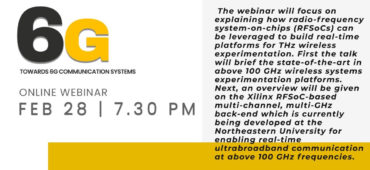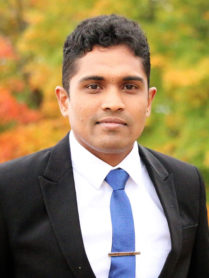6G Communication Systems
6G COMMUNICATION SYSTEMS – ONLINE WEBINAR

Current research in wireless communication is beginning to focus on moving to THz frequency ranges as a solution to find the required bandwidth to cope up with the ever-increasing data rates. Significant advancement has happened at the device level and also in the communication theory aspects to close the THz gap. However, sophisticated real-time wireless test-beds are essential in moving the research in communication at THz frequencies forward. Xilinx radio frequency system-on-chip (RFSoC) devices that were recently developed, integrate multiple high-bandwidth data converters into an SoC. These RFSoCs have drawn much attention in fifth-generation (5G) wireless systems and radar systems as potential enablers of digital beamforming solutions that can support up to a few GHz of bandwidth. In this webinar, how these devices can be leveraged to build real-time platforms for THz wireless experimentation was discussed.
The online webinar commenced with a welcome and introduction about the speaker, Dr. Viduneth Ariyarathna given by the Staff Advisor of the IEEE SPS Student Branch Chapter of University of Moratuwa. The speaker started off the discussion by giving a brief explanation of the state-of-the-art in above 100 GHz wireless systems experimentation platforms. Next, he proceeded by giving an overview on the Xilinx RFSoC-based multi-channel, multi-GHz back-end which is currently being developed at the Northeastern University for enabling real-time ultra-broadband communication at above 100 GHz frequencies. Finally, the audience was given the opportunity to clarify discussed subject matter, during the 30 minute Q&A session. This interactive and interesting session concluded with the Vote of Thanks by the Secretary of the society.
About the speaker
Northeastern University, Boston, USA
Dr. Viduneth Ariyarathna
Biography:
Dr. Viduneth Ariyarathna is currently an Associate Research Scientist at the Institute for the Wireless Internet of Things at Northeastern University, Boston, USA. He completed the B.Sc. in Electronic and Telecommunication Engineering from the University of Moratuwa, Sri Lanka in 2013. He received the PhD degree in Electrical Engineering from Florida International University, USA in 2019 focusing on low complexity multibeam beamforming circuits for millimeter wave communication systems. From 2013 to 2014 he worked for Atrenta Lanka (now acquired by Synopsys Inc.) and he spent the summer of 2018 with Cisco Systems working on FPGA accelerators for IEEE 802.11 networks. His main research interests include software defined radios, one- and multi-dimensional signal processing, RF-systems, and high-speed modem design.


